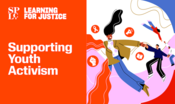Supporting Youth Activism



Schools should be safe and welcoming for all children—on this point responsible adults agree. But currently, discriminatory laws and censorship policies threaten the well-being of children. LGBTQ+ young people and families are being targeted, along with Black, Indigenous and other people of color and members of historically marginalized groups, whose histories and experiences are being misrepresented and erased.
Through learning that teaches honest history, introduces servant leadership (an approach that focuses on leadership in service of the community) and eases entry into the movement for justice, Youth Learning for Justice aims to help young people realize their power to shape the future.
October is Youth Justice Action Month. Commit with us to work toward transforming harmful systems and creating more supportive communities in which all young people can thrive. An important step in creating change together is participating in our election process. Our votes matter.